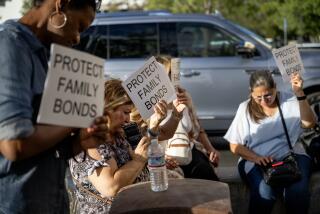Declaration by Ultra-Orthodox Group Intensifies Debate Among Jews
- Share via
Last week was painful for many Jews. Non-Orthodox Jews were troubled by a headline in last Saturday’s Times that reported that an Orthodox group had ruled that they were not Jewish. The headline was an error; it was retracted the next day. Orthodox Jews were outraged that anyone could imagine them acting so preposterously.
Abe Lincoln’s wisdom prevailed. He asked a farmer, “If you call a horse’s tail a leg, then how many legs does a horse have?” The farmer scratched his head and replied, “Why, five, I reckon.” “Wrong,” said Lincoln. “It would have four. Calling a horse’s tail a leg doesn’t make it one.”
Calling a Jew any other name--Reform, Reconstructionist--does not make him or her any less of a Jew. An Orthodox Jew claiming otherwise would be an oxymoron. Orthodox Jews accept the immutability of Jewish law. According to halacha (Jewish law), anyone born of a Jewish mother, or any proper convert, is Jewish. Anyone arguing differently could not be Orthodox.
This definition of Jewishness is confusing to many people, because it is so dissimilar to those employed by other faiths. If you regard Jesus as just another human teacher, Christians will not accept you as Christian. A family tree rich in church faithful will not change that. Reject Muhammad and no Muslim sees you as a coreligionist. A Jewish atheist is a Jew nonetheless.
This is so because Jews are both a people and a religion. We became a faith community, bound by a common code of conduct, with the revelation of the Torah at Mt. Sinai, some 3,300 years ago. We became a people, bound by history and experience, well before that, when God crafted an eternal covenant with Abraham, Isaac and Jacob.
To be sure, these two aspects of Jewishness cannot stand separately. “This nation is a people only by virtue of its Torah,” wrote the medieval philosopher Saadya Gaon. Experience has borne this out. Jews who abandon the richness and tranquillity of a real Shabbat, or the discipline of the dietary laws, are certainly Jewish. But what are the chances that their grandchildren will be? All statistics suggest that the question is rhetorical. In the 20 years prior to the National Jewish Population Survey, the intermarriage rates of Reform and Conservative Jews tripled to 53% and 37%, respectively.
How many legs can you take off a chair and still call what remains a chair? How many pillars of Jewish practice can you abandon, how many treasured beliefs can you jettison, and still engage a Judaism that moves the soul? The Jews gave the world the Ten Commandments. To the non-Orthodox, for whom (in their words) “tradition is only a vote, not a veto,” are they really more than Ten Suggestions? With Jewish religious practice in free fall, and G-d reduced to a principle of liberal activism, is it surprising that outside of an Orthodoxy that is growing by leaps and bounds, Jewish young people cannot run away fast enough from Jewish affiliation? Indeed, most non-Orthodox begrudgingly concede that the Orthodox are the only guarantors of a Jewish future. Meanwhile, the policies of some of the movements, such as the redefining of Jewishness by the Reform movement through a patrilineal standard, compromise the last vestiges of a common Jewish language.
We implore our Jewish brothers and sisters outside of Orthodoxy to reconsider these policies. We Orthodox much prefer an argumentative Jewish family to no Jewish family at all. The thousands of Orthodox lives devoted to outreach to non-Orthodox Jews should make our commitment obvious to all.
At the same time, we deplore hurtful and divisive statements coming from our own that lead to a loss of unity within the Jewish family. Included is last week’s missive that spawned the erroneous headline. These pronouncements are unwanted, and not in the spirit of traditional Judaism.
Why not? Honest Abe’s namesake knew why. Abraham, the founding father of the Jewish people, taught monotheism to the world. According to tradition, he turned chesed--acts of loving kindness--into an art form. He sought out guests, invited them to his table and showed them with a smile that godliness changes and transfigures those whom it touches. The challenge within our community is to live lives so infused with that godliness that Torah will beckon and invite, rather than reproach and reprove. We pledge our unconditional and unstinting devotion to the entire Jewish nation. We ask that our brethren learn who we really are, so that they will never again think us capable of such misadventure. We pray that they will be there with us, united through bonds of love.
More to Read
Sign up for Essential California
The most important California stories and recommendations in your inbox every morning.
You may occasionally receive promotional content from the Los Angeles Times.












